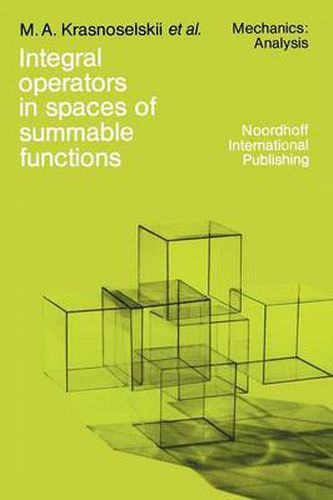Readings Newsletter
Become a Readings Member to make your shopping experience even easier.
Sign in or sign up for free!
You’re not far away from qualifying for FREE standard shipping within Australia
You’ve qualified for FREE standard shipping within Australia
The cart is loading…






This title is printed to order. This book may have been self-published. If so, we cannot guarantee the quality of the content. In the main most books will have gone through the editing process however some may not. We therefore suggest that you be aware of this before ordering this book. If in doubt check either the author or publisher’s details as we are unable to accept any returns unless they are faulty. Please contact us if you have any questions.
The investigation of many mathematical problems is significantly simplified if it is possible to reduce them to equations involving continuous or com pletely continuous operators in function spaces. In particular, this is true for non-linear boundary value problems and for integro-differential and integral equations. To effect a transformation to equations with continuous or completely continuous operators, it is usually necessary to reduce the original problem to one involving integral equations. Here, negative and fractional powers of those unbounded differential operators which constitute ‘principal parts’ of the original problem, are used in an essential way. Next there is chosen or constructed a function space in which the corresponding integral oper ator possesses sufficiently good properties. Once such a space is found, the original problem can often be analyzed by applying general theorems (Fredholm theorems in the study of linear equations, fixed point principles in the study of non-linear equations, methods of the theory of cones in the study of positive solutions, etc.). In other words, the investigation of many problems is effectively divided into three independent parts: transformation to an integral equation, investi gation of the corresponding integral expression as an operator acting in function spaces, and, finally, application of general methods of functional analysis to the investigation of the linear and non-linear equations.
$9.00 standard shipping within Australia
FREE standard shipping within Australia for orders over $100.00
Express & International shipping calculated at checkout
Stock availability can be subject to change without notice. We recommend calling the shop or contacting our online team to check availability of low stock items. Please see our Shopping Online page for more details.
This title is printed to order. This book may have been self-published. If so, we cannot guarantee the quality of the content. In the main most books will have gone through the editing process however some may not. We therefore suggest that you be aware of this before ordering this book. If in doubt check either the author or publisher’s details as we are unable to accept any returns unless they are faulty. Please contact us if you have any questions.
The investigation of many mathematical problems is significantly simplified if it is possible to reduce them to equations involving continuous or com pletely continuous operators in function spaces. In particular, this is true for non-linear boundary value problems and for integro-differential and integral equations. To effect a transformation to equations with continuous or completely continuous operators, it is usually necessary to reduce the original problem to one involving integral equations. Here, negative and fractional powers of those unbounded differential operators which constitute ‘principal parts’ of the original problem, are used in an essential way. Next there is chosen or constructed a function space in which the corresponding integral oper ator possesses sufficiently good properties. Once such a space is found, the original problem can often be analyzed by applying general theorems (Fredholm theorems in the study of linear equations, fixed point principles in the study of non-linear equations, methods of the theory of cones in the study of positive solutions, etc.). In other words, the investigation of many problems is effectively divided into three independent parts: transformation to an integral equation, investi gation of the corresponding integral expression as an operator acting in function spaces, and, finally, application of general methods of functional analysis to the investigation of the linear and non-linear equations.